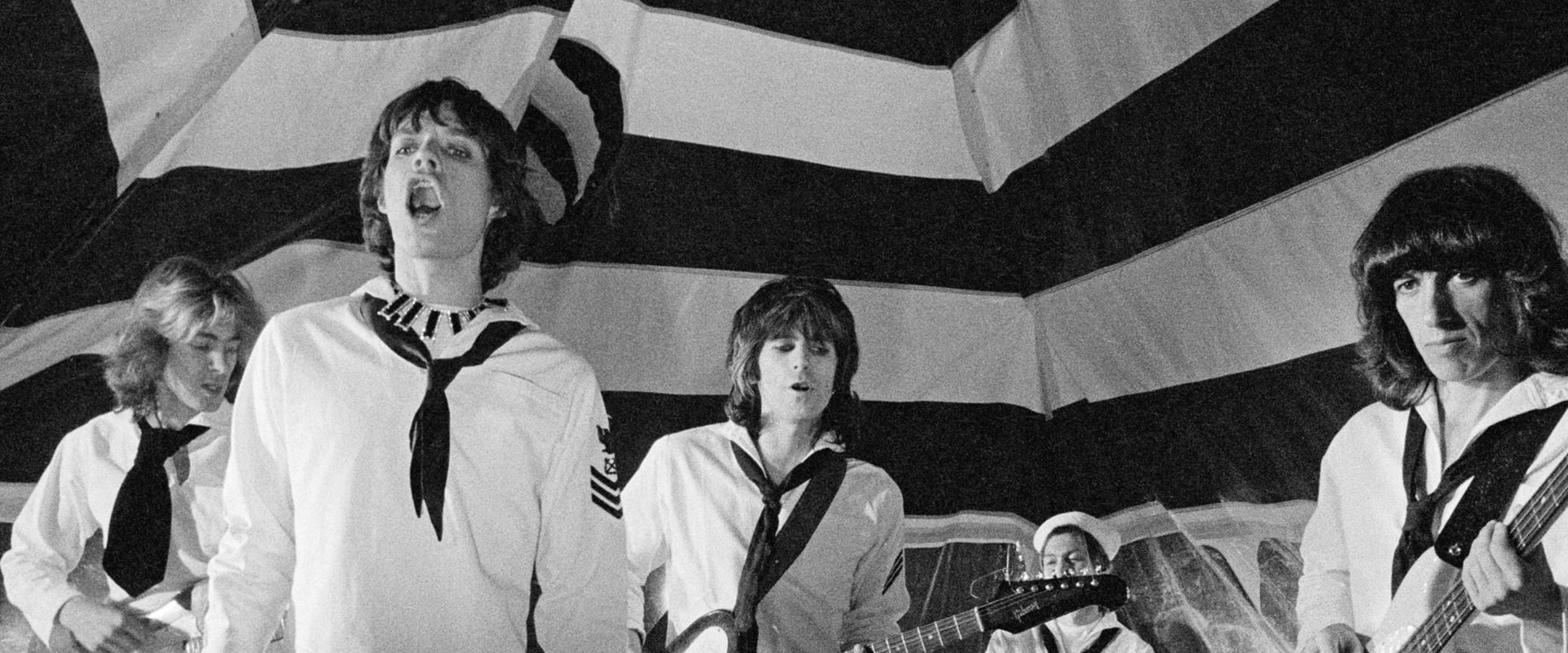In 1969, The Rolling Stones hired 20-year-old guitarist Mick Taylor to replace the late Brian Jones. Taylor spent five years in the band, contributing to albums like Sticky Fingers and Exile on Main Street. Then he exited almost as quickly as he had joined, citing creative differences with Mick Jagger and Keith Richards. On this day in 1974, The Rolling Stones topped the U.S. album charts with It’s Only Rock n’ Roll, their last record to feature Jones.
This Album Signaled a Turning Point for The Rolling Stones
The title track to It’s Only Rock ‘n’ Roll was born in the basement of Faces guitarist Ronnie Wood—who, incidentally, would come to fill Mick Taylor’s spot in The Rolling Stones.
Wood’s home became a sort of gathering place for musicians like George Harrison, Eric Clapton, and David Bowie. “Before any of us knew it we’d be up for days drinking, getting stoned and making music,” Wood later recalled.
During one jam session, Jagger and Bowie began joking around with the phrase, “It’s only rock n’ roll, but I like it.” This was a riff on British comedian Dick Emery’s national catchphrase: Ooh, you are awful – but I like you!”
“It’s Only Rock ‘n Roll (But I Like It)” es el primer sencillo del álbum de 1974 de la banda de rock inglesa The Rolling Stones, It’s Only Rock ‘n Roll. La canción fue grabada originalmente una noche en un estudio en la casa de Wood, ” The Wick ” en Richmond, Londres. David Bowie fue el corista de la voz principal de Jagger, y Willie Weeks tocó el bajo con Kenney Jones en la batería. La canción del álbum es similar a esa grabación original, con los Stones manteniendo la pista rítmica original. Jagger resumió el significado de la letra en las notas del álbum recopilatorio Jump Back de 1993 : “La idea de la canción tiene que ver con nuestra imagen pública en ese momento. Me estaba cansando un poco de que la gente se metiera con todo eso de ‘oh, no es tan bueno como el anterior’. La funda del sencillo tenía una foto mía con un bolígrafo clavándose en mí como si fuera una espada. Era algo desenfadado y antiperiodístico”. Jagger también ha dicho que tan pronto como la escribió, supo que iba a ser un sencillo. Dijo que era su respuesta a todos los que se tomaban en serio lo que él o la banda hacían. Según Richards, hubo oposición a que fuera un sencillo, pero insistieron, diciendo que tenía que ser el próximo sencillo. Dijo que para él “esa canción es un clásico. El título por sí solo es un clásico y eso es todo lo que tiene”. #rollingstones #therollingstones #mickjagger #keithrichards #rock #s #rocknroll #rockandroll #music #charliewatts #stones #blues #brianjones #ronniewood #vintage #classicrock #thebeatles #rollingstonesfans #vinyl #billwyman #beatles #ledzeppelin #guitar #pinkfloyd #therollingstonesfans #rockmusic #forsale #keef #cnn #medan
“We all knew it was good,” Wood said. “But no one thought for a minute it would be such a big hit.”
[RELATED: 3 Beloved Rock Albums That Were Never Toured]
It’s Only Rock ’N Roll became the fourth of eight consecutive Stones albums to hit No.1 in the U.S. It fell just short of the top spot in the Stones’ home country, peaking at No. 2 in the United Kingdom.
Mick Taylor’s Departure
Mick Taylor officially left The Rolling Stones in January 1975. He had plenty of reasons, and one of them was his belief that he wasn’t receiving proper credit. Taylor reportedly contributed to “Till the Next Goodbye” and “Time Waits For No One.”
“I did have a falling out with Mick Jagger over some songs I felt I should have been credited with co-writing on It’s Only Rock ‘n Roll,” the guitarist said. “We were quite close friends and cooperated quite closely on getting that album made. By that time Mick and Keith weren’t really working together as a team so I’d spend a lot of time in the studio.”
This assessment contradicted a statement Jagger made during a 1995 interview with Rolling Stone. The frontman claimed that Taylor “maybe threw in a couple of chords” on “Time Waits For No One.”
Featured image by Michael Putland/Getty Images

